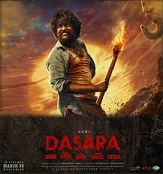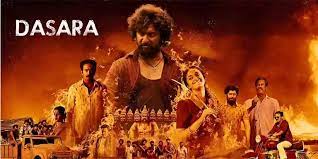
Nani’s Dasara, Review: The bar is on fire!
One way of owning a film, an extension of the auteur theory, would be to name the film with your name preceding the title. Might sound quirky to some, but so what? It is his film, and he can call it Nani’s Dasara or whatever else he likes. But you do wonder why Telugu actor Nani chose to call it his Dasara when he has neither written nor directed it, not even produced it. The nomenclature is a reference to the Dasara (Dussehra) festival, which forms the climax of the story, in which case it should have been Dharini’s Dasara, for that is his name in the film. Incidentally, the film is dedicated to the late actress, Silk Smitha, and her poster is prominently displayed time and again.
Nani’s Dasara takes pains to be different from the blood bath Telugu stuff dished out in the recent past, but only partly. When the time comes, there is no holding back of the choppers. In between, the film involves us in a delicate love story, well-treated, and also presents hordes of characters who guzzle alcohol by the bottle. It is this mish mash that takes you away from the earthy, deglamourised flavour, that more often than not, rings true. Nani’s Dasara is a cocktail that may not be everybody’s cup of tea. It leads to a spectacular climax, but by then the viewer has had more than his share of the various concoctions.
A clever, slippery coal wagon thief, who can outsmart the police at will, Dharini lives in a village where everybody drinks, and drinks hard, so does he. As a child, he grew-up nursing secret infatuation (actually love) for Vennela. His best friend was and is Suri, who is madly in love with Vennela, a love she reciprocates. Dharini does not let anybody get a whiff of his one-sided love. Vennela, now a school-teacher, is to be married to Suri. The village is a hotbed of politics, and the headman (sarpanch) gets to run the only bar around, and make tons of money. Suri approaches the women in the village, women who have never voted in any election. He convinces them they should vote for a particular candidate. Against all expectation, his man wins, a victory his opponent is very bitter about.
Out of the blue, a bunch of deadly assassins attack Dharini and his friends. They have to run for their lives, but they just cannot shake off their predators. Suri gets hold of a cycle and, with Dharini at the back-seat, he pedals like hell. But a deadly chopper blow decapitates Suri. When the mayhem ends, three of Dharini’s friends are dead, and Vennela is a widow before getting married. This breaks Dharini’s heart twice over. He is wondering who the assassins were, for he is sure they came from outside his village. And then he discovers that a secret admirer of Vennela is behind the murderous attack. He goes to the man’s house, but finds that he is away for a day. But his wife confirms that her besotted husband will go to any extent to get Vennela.
One of the four writers, Srikanth Odela, has directed the film. The other three writers are Jella Srinath, Arjuna Paturi and Vamsi Krishna P. This is Odela’s debut film, after assisting Sukumar in Nannaku Prematho and Rangasthalam. With some liberties, the film can be divided into four parts: 1. The coal-thieves and drunkards 2. The childhood love triangle 3. The political mafia and 4. The Dasara Climax. Nani’s Dasara is a good example of four writers working in four different narrative directions. To an extent, Srikanth Odela has succeeded in intertwining the four tracks, which is to his credit. The biggest inspiration seems to be the 1964 Raj Kapoor film, Sangam, about the eternal triangle, though the writer(s) have given it an interesting twist here.

It’s an odd mix of impressive scenes and tropes. The old woman (mother?) of Dharini, and the two politicians, are type-cast. On the other hand, the scenes of Dharini breaking down at Suri’s death and his revolutionary decision to save Vennela her trauma, strike a chord. The coal heist opening is merely a whistle opportunity, while the burning down of the bar is a novel twist. Why do comely village belles have to be school-teachers? Raw, earthy look is well created, and the designation of Dharini as a member of a low Hindu cast is in the fitness of things. The Muslim card is played, but only as a token. His friend’s advice to Dharini to go to Vennela and confess his love is ill-conceived, as it would achieve nothing. She is strongly in love with Suri. It is indeed odd to see the politician’s wife accompany him everywhere, even when he goes out to threaten people. This is all the more confusing, because she hates him and his wayward ways. As was explained by Nani at a press meet a few days ago, the names of the three lead-players have significance: Dharini means the earth, Vennela means the moon and Suri stands for the sun. Whatever symbolism might have been intended by these choices, it was lost on the audience, at least of the dubbed Hindi version that we were shown.
From a clap-trap opening, Nani goes through two major role-plays: the first is that of a drunken lout and the second is that of a moping but sacrificing one-sided lover. It is not a major challenge to any actor worth his salt to play drunken lout. The second one demands some under-acting, and he rises to the occasion. And then there is the one scene where he steals your heart, when he goes to meet Vennela and all her ornaments are being removed because Suri is dead. He does a great job of reacting to the decapitation of Suri. As it happens, there are very few scenes between Vennela (Keerthy Suresh) and Nani. Keerthy Suresh pairs with Nani after Nenu Local. Though she does not have a major role, she impresses within the few scenes that gets. A regular glam-girl in real-life, she is made to look dusty, and it is to her credit that she shines in spite of the deglam. Cinema is in her blood, being the daughter of producer G. Suresh Kumar and actress Menaka G. Suresh. Completely uninhibited, at 30, she already has ten years of work behind her, and many more will follow.
Dheekshith Shetty is the surprise packet. His role as Suri was kept under wraps, and he more than justified his casting. And this is only his second feature. He has sharp features and an emotive countenance. Adequate support comes from Shine Tom Chacko as Chinna Nambi, Samuthirakani as Shivanna, Chinna Nambi’s father, Sai Kumar as Rajanna, Shivanna’s step-brother, Jhansi as Vennela’s mother, Poorna as Chinna Nambi’s wife and Rajsekhar Aningi as Inspector Nagaraju.
Cinematography by Sathyan Sooryan captures the raw, earthy colours but is sometimes too dark. Editor Naveen Vooli has probably had to let his scissors talk, for so many scenes start with a jerk, and yet the film is 147 minutes long. The songs in Hindi, composed by Santhosh Narayanan, are some of the most sub-standard stuff I have heard.
Not too many films have their characters guzzle like fishes, but how many films can you count where the hero, in a moment of inspiration, sets fire to the only bar around, thereby by heralding a new era of a liquorless village? It’s hard to believe that help was might not have been needed from Alcoholics Anonymous, before the utopian dream of a teetotaler village was realised, if at all. After all, a bar is all about fire and ice. It could be here today, there tomorrow.
Rating: **














